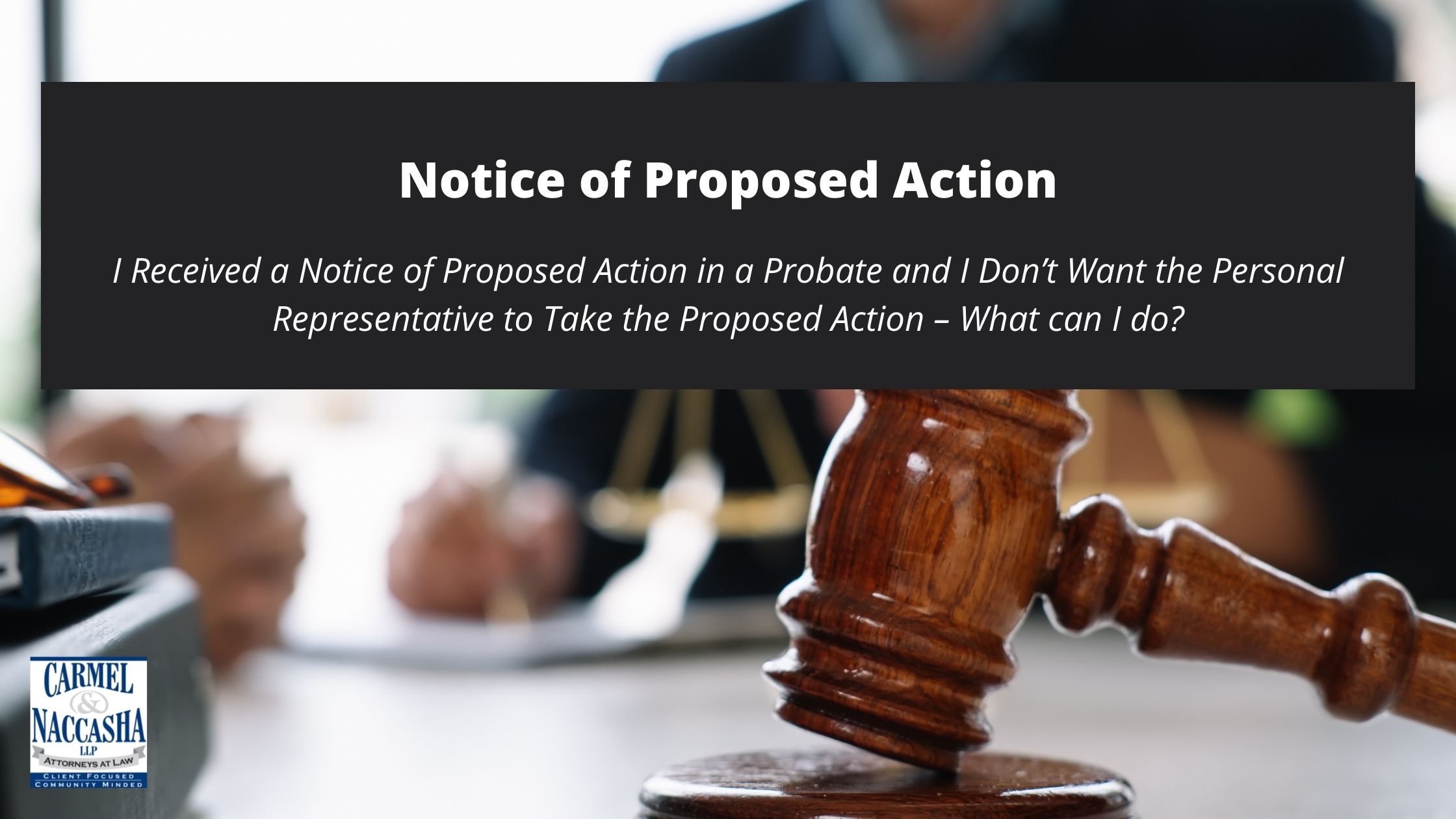The Probate Process
Probate is the court process through which the estate of a decedent is inventoried and distributed to the decedent’s beneficiaries or heirs. When a probate is opened, the court appoints a personal representative of the estate to marshal assets and distribute them to the proper recipients. The personal representative is sometimes called the “executor” or “administrator,” depending on whether the decedent died with a will. The court can grant the personal representative full or limited authority to take certain actions without court oversight under the Independent Administration of Estates Act.
The Notice of Proposed Action
Even if the personal representative is granted full authority to administer the estate, the personal representative must provide written notice to the heirs, beneficiaries, and any other interested person of the decedent’s estate prior to taking certain actions. The actions requiring prior notice are enumerated in the Probate Code and depend on the type of authority provided to the personal representative, but generally include selling real property, selling the decedent’s business, granting an option to purchase real property, or distributing certain cash gifts under the decedent’s will.
What does the Notice indicate?
The notice provided by the personal representative is called a Notice of Proposed Action Notice. The Notice indicates that the personal representative is about to take an action, like sell a house, and it must include a specific description of the proposed action. If it involves the sale or transfer of real property, the Notice must state the material terms of the transaction, such as the sale price and any commission to be paid to a real estate agent or broker.
The Notice must be mailed to the required parties at least fifteen (15) days prior to the date that the proposed action will be taken.
Objecting to a Notice of Proposed Action
What if you don’t agree with the action the personal representative is about to take? Perhaps the personal representative is about to sell a house for less than what you believe it’s worth. You can object to the proposed action.
How to object
Whether the personal representative uses a standard Judicial Council form for the Notice, the Notice must contain a section for objections. This makes it simple for you to object: you can just check the box indicating your objection and sign the form where indicated. You can also write your own objection separately, as long as it identifies who you are and the proposed action to which you object.
Either way, the objection must be made in writing and delivered or mailed to the personal representative. To be timely, the personal representative must receive the objection before the date the proposed action will be taken. If the proposed action is taken at a later date, the objection will be timely as long as it is received before the date the action is actually taken.
Restrictions on the action
Once an objection is made, the personal representative cannot take the proposed action without the court’s oversight. If the personal representative wants to pursue the proposed action, they will need to seek court supervision or instructions authorizing the action.
Be aware that if the personal representative ignores your objection and goes through with the action without court oversight, the action is not automatically invalidated. For example, if real property is sold to a third party buyer over your objection, the buyer will hold title to the property, as long as the buyer had no notice of the dispute.
Importance of filing your objection with the court
For that reason, it is strongly recommended that you also file your objection with the court, along with your reasons for disagreeing with the proposed action. That filing will trigger a hearing date where the court will let the parties have their say before determining whether the personal representative can proceed.
In some circumstances, you can also file for a restraining order to prevent the personal representative from taking the proposed action without court supervision.
A Powerful Tool
Objecting to a Notice is a simple process with a powerful effect. It requires the personal representative to seek the court’s oversight for the proposed action. Filing your objection with the court goes one-step further – it ensures that your objection will be heard by the court. If you have received a Notice, have concerns and want to object, the experienced trust and estate litigation attorneys at Carmel and Naccasha, LLP can help.
Contact Legal Professional
The information provided herein does not, and is not intended to, constitute legal advice; instead all information, content, and materials are for general informational purposes only.
If you have any questions, please contact Carmel & Naccasha, and for more details, read our full disclaimer.

